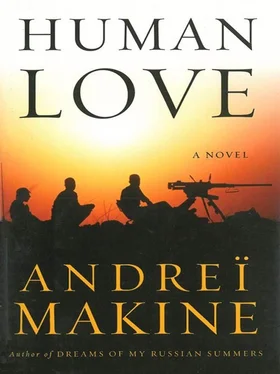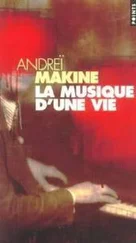***
Elias saw this young man with Anna the following evening. Thanks to the conversation in the lecture hall he knew that Vadim was a Muscovite, the son of a senior government official. “If I were you,” Gina had yelled, Td stick to him like glue. In two years’ time hell have a diplomatic post abroad.” Elias had pictured him as tall, arrogant, athletic, a worthy representative of the capital’s gilded youth. He detested him before having seen him.
Vadim came into the entrance hall of the library and for a few seconds was blinded. He took off his misted-over spectacles, began wiping them, and, with his myopic eyes tightly screwed up, peered into the surrounding haze. He was tall, with a slight stoop and a handsome face spoiled by the childish softness of his lips. In taking a handkerchief out of his pocket to wipe his glasses he had dropped a small piece of card, no doubt his library ticket. He leaned forward, looking around him still with this tentative, myopic air. Elias, who was watching the scene reflected in a mirror at the end of the entrance hall, had an impulse to go and help him.
Anna arrived at that moment, picked up the card, walked with Vadim to the exit. They paused a few yards away from Elias, who caught the young man’s half wistful, half vexed words: “No. You know, Mama’s told me I’ve got to be careful about my bronchitis. Especially because out there, in midwinter…” They went out, and Elias noticed that Anna’s gait was indeed no longer the same: the measured steps you take alongside an old man.
Two days later he learned that during the vacation she would be going to her village in eastern Siberia. “Perhaps I could…” It did not feel as if he were asking her, it was the echo of a dream finding expression almost without his knowing it. “It takes seven days, and it can easily reach fifty below over there,” she replied, as if trying to dissuade him.
In the course of the umpteenth assault on the “presidential palace,” Elias stumbled, fell, and sprained his foot. Having succeeded in making the doctor believe this, he gained an extra week of leave.
They set off just as the weather had turned warmer. Moscow smelled of damp turf. During the second night, in a station close to the Urals, Elias climbed down onto the footboard of the coach and found he could not breathe. The frozen air had the cutting hardness of a crystal.
EXTREME COLD DARKENS THE SKIN more than sunburn. Elias learned this from observing the Siberian who got onto the train at Krasnoyarsk. A face burned by chilblains, hands rutted with swarthy cracks. “That’s right. It’s the true color of gold,” the man joked, in response to Anna’s quick glance. He was sharing a compartment with them. Out of his bag a meal appeared: an earthenware pot containing salted mushrooms (“We’ll give them time to breathe, the brine’s completely frozen”), smoked elk meat, a couple of pints of dark vodka infused with bilberries. He offered it, too, to an elderly woman who spent every day on her couchette opening and closing a little casket. He talked about his occupation, about extracting nuggets from the permafrost, about how his sleep was plagued by swarms of mosquitoes and the growling of bears. After the third glass he thumped Elias on the shoulder and proclaimed with warm, fraternal emotion, “Last January when it was sixty below and windy as well, I turned blacker than you in the -” He was about to say “face” but stopped himself and uttered a word that was incongruous, because too old-fashioned and poetic in the context, life, more appropriate for the countenance of an icon.
Everyone laughed, and Elias perceived the distance they had traveled since Moscow. His color no longer made a monkey of him, nor a propaganda symbol, nor a totem that required bowing and scraping from humanists. It was visible, of course, but just like the marks of frost on a face. All the man in his clumsy way wanted to say to him was: “The fact that you re black is nothing. Worse things happen.” He talked about one of his comrades who had had an arm torn off by an excavator. The woman told them that what she was carrying in her casket was her husbands ashes, as well as the fragment of a shell that had remained in the old soldiers leg for thirty years…
They were drawing close to the limits of the empire, a place where brutalized lives run aground, human beings considered undesirable in the big cities. This end of the world blended together a multiplicity of ethnic groups and customs, a variegated universe that embraced this African as one more nuance in the chaotic mosaic of humanity. Elias would become aware of this later. For the moment he was trying to befriend a Buryat child, who was out in the corridor staring at him from the narrow slits of his eyes. Who am I for this child? Elias wondered. Maybe simply the closest to what I am…
***
At the start of the journey Anna seemed tense, vigilant over every word spoken. Traveling in the company of a black man, that’s a bold exploit! he thought, with a smile. The “rutting orangutan” came to mind, and he guessed that she dreaded an even more extreme gesture, a remark that would put her on the spot. To be taken for a monster of lubricity amused him, especially since for days now the only question that had truly preoccupied him was how to explain what the scent of the snow in the folds of that gray woolen dress meant to him. And the footprints they left at a tiny remote station in the middle of the taiga. And the fragrance of the tea she brewed for him each morning. There was more truth in the headiness of these moments than in all the declarations of love in the world. But to say so would already have been a declaration.
The journey lasted so long that one evening he caught himself having forgotten its goal. Or rather the sole purpose of the endless pounding of the track was now these brief lapses into beauty, and he did not know how to talk about them to Anna.
She no longer seemed on her guard; far from it, Elias’s attitude intrigued her. She was clearly hoping for something other than this friendly and attentively protective presence…
The woman with the casket left them at Irkutsk, the gold prospector at a village beyond Baikal. They found themselves alone, their eyes fixed on the fading of the sparks given off by the sunset outside the window layered with hoarfrost. The last night of their journey was beginning. Now they needed to talk, to clarify the situation, or else, without saying anything, embrace, exchange caresses, give themselves… Or instead, laugh, tell jokes, assume the role of good pals. Mentally they were rehearsing these scenarios, but all of them seemed false. The scarlet blaze on the window turned to violet, then was extinguished. There came a moment when it seemed impossible to turn away from the window, to meet one another’s eyes and smile…
A light tapping on the door drew them out of this torpid state. The little Buryat boy was watching them fixedly, with slightly arched eyebrows, pursing his lips, in an expression that seemed to respond to the intensity of what he sensed in them. They exchanged glances and began to laugh softly. Yes, how could he make this young woman understand that the simple freshness of the snow, as it lingered on her dress, was already abundant happiness, a true love story that had unfolded ever since their wanderings through Moscow beneath storms of white? How could she tell this man that he had become important to her, strangely, despite all she thought about men, white or black, and all she believed about herself, tell him that his presence there was obvious and natural, as if he had been at her side long long ago beneath this Russian sky, as if he had always been there, and always would be? She thought he was like that aircraft from the last war set in a block of concrete in the city where she went to high school. It was the district where the city s worthies lived, and there this 11-2 ground attack aircraft, nicknamed “Black Death” by the Germans, proudly reared its dark, elongated silhouette amid pretentious, humdrum lives. Anna suppressed a smile: this far-fetched comparison was perfectly apt but completely unmentionable, as apt things so often are.
Читать дальше









